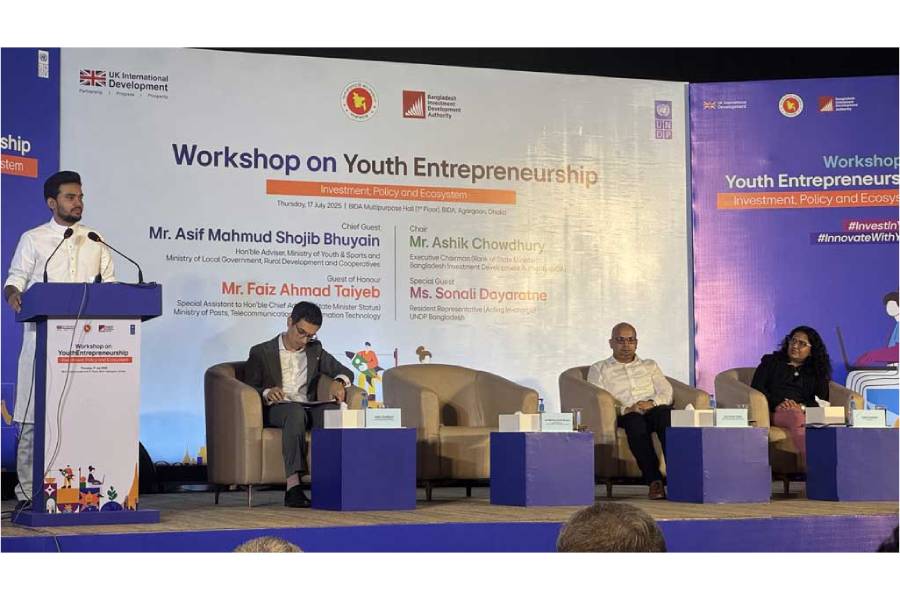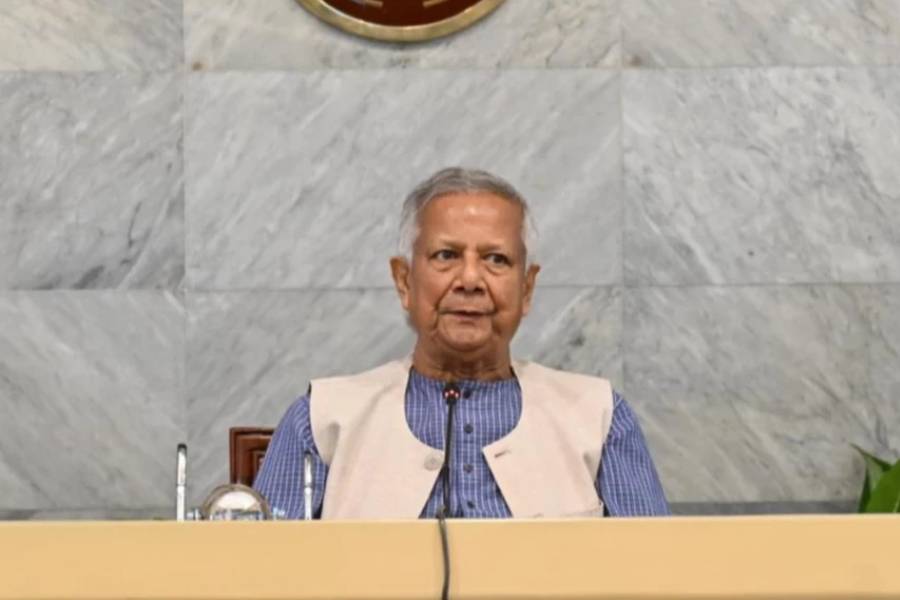Interview: Asif Nazrul
Conscious effort is made not to take sides with any party
Law Adviser Asif Nazrul during an interview with Prothom Alo
Professor Asif Nazrul is the law adviser to the interim government. In an interview with Prothom Alo, he speaks on a range of issues, including the government’s successes and failures over the past year, justice for the July killings, indiscriminate cases and arrests, mob violence, allegations of political bias, social inequality, the Pay Commission for public servants, elections, and the ban on Awami League activities. The interview was taken by Rajib Ahmed on 1 August at the official residence of the Law Adviser. Today we present the second part of the interview.
Prothom Alo: The government will complete one year at the helm on 8 August. Is there any possibility of reshuffling based on performance? You would perhaps agree that some advisers have done well, while others have not quite measured up.
Asif Nazrul We face a lot of criticism, often quite harsh. But when I look at everyone individually, many among us are doing a very good job. Our economic adviser, Salehuddin Ahmed bhai, energy adviser, Fouzul Kabir bhai, and trade adviser, Sheikh Bashiruddin bhai are all doing well. Our religious affairs adviser AFM Khalid Hossain bhai has done an excellent job with Hajj management. I could name others too.
As for failures, it would not be appropriate for me to name names, that is for you to judge.
But we all have a sense, from Sir’s (Professor Yunus’) body language and his way of working, how much he values each of our contributions.
Prothom Alo: Let me ask a follow-up question. During the previous government’s tenure, we saw that no matter how much criticism there was, Sheikh Hasina never replaced anyone. She didn’t take heed of any criticism. Will this government follow the same path?
Asif Nazrul No, but then some of the criticism is extremely harsh. If someone is to be removed on the basis of that kind of criticism, then criticism could start against everyone.
Prothom Alo : But isn’t there also reasonable, valid criticism?
Asif Nazrul In such cases, things have to be considered in totality. For instance, something may seem like reasonable criticism, but if Sir (Professor Yunus) is not convinced, based on intelligence reports or other information, then taking action might discourage the concerned persons.
Some of us may have shortcomings, or be accused of inexperience. But have you heard of any allegations of corruption? There may be some campaigns against one or two individuals, but those aren’t based on proven facts. Do you hear accusations that we don’t show up to work? That we engage in nepotism? You don’t.
Prothom Alo: We've heard that some advisers show up at the office after 2 PM. We're only talking about one or two individuals, no one is saying the entire advisory council should go.
Asif Nazrul I'm not quite aware of that.
Prothom Alo : When it comes to decision-making and discussions in the advisory council, is there ever a concern that outsiders might get to know what's being discussed?
Asif Nazrul I don’t think so. There is no gap between the army and the government. It is for the election commission to decide if during the election more responsibility needs to be given to the army.
Prothom Alo : Given concerns about law and order and possible disruptions to the election, do you believe you will be able to deliver a free and fair election?
Asif Nazrul Absolutely, we will.
Prothom Alo : Some say that without a more active role by the army, it won’t be possible to hold a fair election. There's also talk of a distance between the military and the government.
Asif Nazrul There is absolutely no distance, rest assured. These are simply far-fetched speculations. In fact, some external forces have unfairly tried to blame the army in certain situations. Speaking as someone who was on the ground during the mass uprising, I can say that although the army is a branch of the government, it played a supportive role in the uprising as a whole. Sadly, some segments of society do not respect that. Yes, it’s possible that, in isolated cases, some individuals within the army may have engaged in reprehensive acts, but overall, their role was highly commendable. What I’m saying is, there is no gap between the army and the government. It is for the election commission to decide if during the election more responsibility needs to be given to the army.
Prothom Alo: Does the government have any partiality towards the new party, National Citizen Party (NCP)? Many say two government advisers are affiliated with them.
Asif Nazrul At the decisive moment of the mass uprising, it was undoubtedly led by students, no one can deny that. When our government was formed, I remember hearing criticism about why there were so few student advisers. So when some friends of those student advisers formed a party, it may have seemed in some instances that the government was giving NCP special privileges. But in reality, that is not so.
Because of their leading role in the uprising, NCP is highly vulnerable. That is why they’ve been given extra security in places like Gopalganj and a few other areas. BNP and Jamaat are long-established, well-organised parties. NCP is not. If something happens to them, if they’re attacked anywhere, will the public forgive us?
Prothom Alo : From the way NCP leaders speak, they hardly seem vulnerable.
Asif Nazrul In my view, a newly formed party can have many supporters, but they still don’t have many organisers or much experience. There’s another reason they need protection: NCP leaders are likely to be the first targets of the fallen Awami League.
We have intelligence reports indicating that Awami League instigated several protests against the government, including unrest involving Ansar personnel. There is credible evidence supporting this.
Prothom Alo: What would you say in response to the claim that you are distant from BNP but close to the religion-based parties? BNP secretary general Mirza Fakhrul Islam Alamgir has expressed concern about the rise of right-wing forces.
Asif Nazrul During the 15 years of Awami League rule, the religion-based parties were subjected to severe injustice and repression.
Prothom Alo : BNP too has been a victim of injustice and repression.
Asif Nazrul Among centrist parties, it’s BNP. But in terms of numbers, the religion-based parties are greater. They have endured extreme persecution, arrests, disappearances, and they played a significant role during the July uprising. Naturally, we have to engage with them.
Prothom Alo : Engagement is expected. But the question is, are you closer to them than to the BNP?
Asif Nazrul Some say we’re close to NCP, others say to the religious parties. After the London meeting between Professor Yunus and BNP’s acting chairman Tarique Rahman, some even claimed that the government is close to BNP. But when it comes to decision-making, we consciously and deliberately avoid taking the side of any party.
Prothom Alo : In some rallies, there were threats made to behead members of civil society. Yet no action was taken. Why?
Asif Nazrul I think the police, who were supposed to take action, thought this was just political rhetoric. Taking action might provoke extremism further, and it might not be good for the safety of those involved. From what I’ve seen, the people who were threatened haven’t really reduced their public engagement. When running the state, you sometimes have to consider whether taking action might escalate things further.
Prothom Alo: Awami League's activities are now banned. Many people support the ban remaining in effect until the trials are over. But some are asking whether an executive order preventing Awami League from contesting the elections might raise questions abroad.
Asif Nazrul Those who want to raise questions will raise them anyway. But just look, there is no remorse within Awami League. On the contrary, their leader and other senior figures are claiming we committed the massacre and are openly declaring that if they return to power, they will take revenge and hang us.
Can you run a country while allowing political activities by a party that talks like this and tries to create chaos whenever it gets the chance? Can you bring them to justice under such conditions? It would create a completely unmanageable situation, plunging the country into violence and bloodshed. That would open the door for other destructive forces in Bangladesh to interfere. This concern is very real and, I believe, entirely justified.
Prothom Alo : Some people are saying that instead of banning the Awami League through executive orders, it would be more effective to let the people reject them themselves.
Asif Nazrul That’s true, being rejected by the people carries even more impact. But we genuinely fear that if Awami League remains active, not just in elections but in politics more broadly, it will become impossible to hold elections or even govern the country. We have intelligence reports indicating that Awami League instigated several protests against the government, including unrest involving Ansar personnel. There is credible evidence supporting this.
Prothom Alo: The government sent mangoes to India, and dispatched physicians after the Indian fighter jet crash. We're seeing fewer anti-India statements from the advisers these days. How are relations with India?
Asif Nazrul We do not want to be India’s enemy, but we don’t want to be its servant either. We want a relationship based on mutual respect and equality.
To be continued.................









